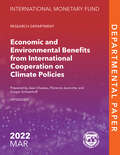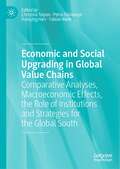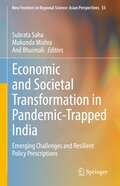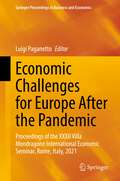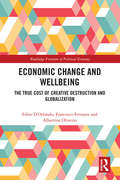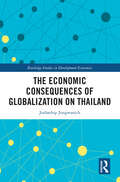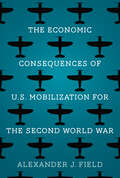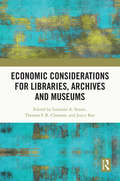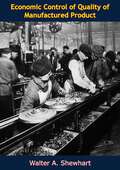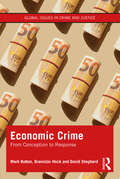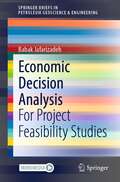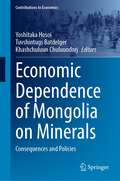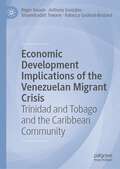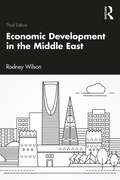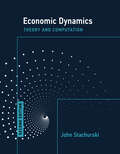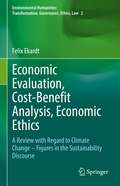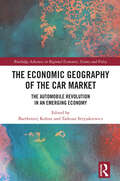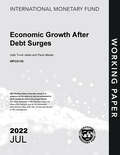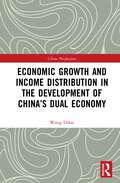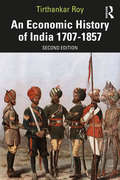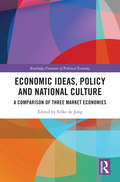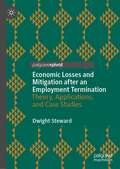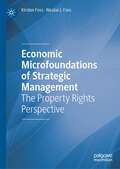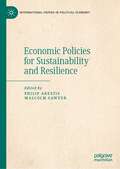- Table View
- List View
Economic and Environmental Benefits from International Cooperation on Climate Policies (Departmental Papers)
by SchwerhoffA report from the International Monetary Fund.
Economic and Social Upgrading in Global Value Chains: Comparative Analyses, Macroeconomic Effects, the Role of Institutions and Strategies for the Global South
by Christina Teipen Petra Dünhaupt Hansjörg Herr Fabian MehlThis book investigates how global value chain governance, public institutions and strategies in the area of industrial policy and industrial relations by stakeholders such as national or global trade unions, governments, companies or international NGOs shape upgrading in the Global South. A special feature is its interdisciplinarity, combining sociological, economic, legal and political dimensions. Case studies systematically compare different industry trajectories. Furthermore, it encompasses far-reaching insights into the role of global value chains for development, economic catching-up of countries and socio-political aspects such as working conditions and interest representation.
Economic and Societal Transformation in Pandemic-Trapped India: Emerging Challenges and Resilient Policy Prescriptions (New Frontiers in Regional Science: Asian Perspectives #55)
by Mukunda Mishra Subrata Saha Anil BhuimaliThis book acquaints the reader with the critical changes in India’s economy and society amidst the unprecedented pandemic outbreak of COVID-19, which has been devastating by breaking all prior records of illness and fatality. The present crisis is shown to be more than an acute health hazard as it carries with it other threats associated with the economy, society, culture, psychology, and politics. The dynamic driving forces that have a significant bearing on life, space, and time are explored, providing a basis on which social scientists can understand the prevailing equations and project the unforeseen future to contribute to a policymaking mechanism. The Indian scenario presented here takes into account how the COVID-19-induced lockdown of transport services, closing of factories, and restrictions on mobilization have caused the economy to face a recession, affecting mostly the unorganized sector. Travel restrictions and quarantines affecting hundreds of millions of people have left Indian factories short of labour, causing havoc in the production system. Semi-skilled jobholders have lost their employment, and the country has witnessed the plight of large pools of migrant labourers returning on foot to their homelands hundreds of miles away with their families and belongings. Contributors to this volume are drawn from diverse disciplines, displaying the solidarity of academic knowledge in a physically divided world. This common platform is provided to the practitioners of relevant academic disciplines under the umbrella of regional sciences – a forum for the exchange of ideas that may be effective in the sustainable management of the crisis and a way forward after it is mitigated. Thought-provoking discussions regarding different facets of the crisis are relevant not only to the current times but also to being prepared for the unforeseen post-COVID economic and societal order.
Economic Challenges for Europe After the Pandemic: Proceedings of the XXXII Villa Mondragone International Economic Seminar, Rome, Italy, 2021 (Springer Proceedings in Business and Economics)
by Luigi PaganettoThis book focuses on the recovery and new normal in a post-Covid scenario, drawing important lessons from the pandemic and proposing new ideas for sustainable development, endogenous dynamism, and inclusive growth. The book presents different ideas and perspectives about the present and the future, reflecting on four main fields of our economic reality: macroeconomics, governments, technology, and society. It discusses important topics for future economic scenarios, beginning with an estimation of the economic consequences of the absence of an equitable distribution of vaccines. Further topics discussed include the government’s debts sustainability, the probability of an inflation/deflation or of a stagflation scenario, as well as the impact of US and European economic policies on economic growth. The book further investigates the economic costs of the pandemic, which have fallen most heavily on those least able to bear them. It examines governments subsidies, which supported people and firms through wage subsidies, unemployment benefits, and other fiscal measures, and discusses the question of whether more investment in health care, education, and other public services will still be needed. In a time of immense change and global challenges, this book is a must-read for scholars, researchers, and students of economics, as well as policy-makers interested in a better understanding of economic growth, energy, environment, migration, development, digital transformation, and demography.
Economic Change and Wellbeing: The True Cost of Creative Destruction and Globalization (Routledge Frontiers of Political Economy)
by Fabio D'Orlando Francesco Ferrante Albertina OliverioTechnological progress and globalization have generated indisputable benefits, but also relevant costs, such as growing economic inequality, economic fluctuations, and financial instability. Mainstream economics has usually considered these costs as temporary, evenly distributed, and more than compensated by the gains of the phases of economic expansion. In this book, which focuses mainly (though not only) on the labor market, the authors contend that the major costs of the intensified process of creative destruction, through which economic change proceeded, have been ignored and the benefits overrated, thus incorrectly estimating the net impact of economic growth on subjective wellbeing. The book argues that the positive consequences of economic change and globalization may not compensate for the negatives, because psychological losses are felt more strongly than gains (due to loss aversion) and the costs are unequally distributed (those on low incomes disproportionately suffer more). The result is an overall reduction in wellbeing and therefore appropriate policies are necessary to allow more people to enjoy the benefits of technological progress without suffering the costs. The authors develop a comprehensive framework in which the socio-psychological context and educational level of a community determine the most suitable policies both for the short and for the long run. The book makes an invaluable contribution to the literature on economic growth and development, labor economics, the economics of wellbeing, and applications of behavioral economics. The readers that may be interested in this book are economists and other social scientists, but also general readers, since the analysis is maintained simple and accessible. University teachers can use the book for courses on economic growth and development, on labor economics, on the economics of human capital, on the economics of wellbeing, and on applications of behavioral economics.
The Economic Consequences of Globalization on Thailand (Routledge Studies in Development Economics)
by Juthathip JongwanichThis book explores the impact of globalization, especially in the context of trade and investment policies, on the key economic outcomes, including innovation, productivity, employment, and wages, using Thai manufacturing as a case study. The book looks at the impacts of the shift of manufacturing share from industrialized to emerging countries and emergence of ‘global value chains’ (GVCs) as well as liberalization through the proliferation of free-trade agreements (FTAs) on key economic outcomes. The book highlights that globalization, through trade (including the parts and components trade) and investment, continues in Thailand amid the anti-globalization sentiment since the onset of the new millennium, especially the US–China trade war and the COVID-19 pandemic. Thailand has gained considerable benefit from trade and investment liberalization in various forms, including innovation, firm productivity improvements, and workers’ skills enhancement. Although the country has prospered in these areas, several further enhancements are needed in order to effectively harness the benefits available from globalization, including continued trade and investment policy reforms. Key policy inferences are provided in the last chapter. The book will appeal to those with an interest in international economics, especially issues relating to the economic consequences of globalization. It will also appeal to policymakers and practitioners responsible for international trade and investment regulations.
The Economic Consequences of U.S. Mobilization for the Second World War
by Alexander J. FieldA reminder that war is not always, or even generally, good for long-term growth Many believe that despite its destructive character, war ultimately boosts long‑term economic growth. For the United States this view is often supported by appeal to the experience of the Second World War, understood as a triumph of both production and productivity. Alexander Field shows that between 1941 and 1945 manufacturing productivity actually declined, depressed by changes in the output mix and resource shocks from enemy action, including curtailed access to natural rubber and, on the Eastern Seaboard, petroleum. The war forced a shift away from producing goods in which the country had a great deal of experience toward those in which it had little. Learning by doing was only a partial counterbalance to the intermittent idleness and input hoarding that characterized a shortage economy and dragged down productivity. The conflict distorted human and physical capital accumulation and once it ended, America stopped producing most of the new goods. The war temporarily shut down basic scientific research and the ongoing development of civilian goods. U.S. world economic dominance in 1948, Field shows, was due less to the experience of making war goods and more to the country&’s productive potential in 1941.
Economic Considerations for Libraries, Archives and Museums
by Lorraine A. Stuart Thomas F. R. Clareson Joyce RayEconomic Considerations for Libraries, Archives and Museums provides insight into the economics of collaboration across Libraries, Archives, and Museums (LAMs) and cultural heritage funding. Drawing together a series of global reflections on the past, present and future of cross-sector approaches to preserving and promoting cultural heritage, this volume examines the economic prospects of LAMs from a variety of facets. Divided into five sections, the book covers the five most important areas in the development and sustainability of collaborative LAM projects: the digital environment; collaborative models; education; funding issues; and alternate sources of funding. Responding directly to the issue of a lack of adequate funding for maintaining and providing access to cultural heritage resources globally, the book argues that cultural heritage institutions must seek creative methods for funding and collaboration at all levels to achieve shared goals. Economic Considerations for Libraries, Archives and Museums will be of interest to all those engaged in the study of library and information science, archival studies, museum studies and digital preservation. Administrators and practitioners will also find much to interest them within the pages of the book.
Economic Control of Quality of Manufactured Product
by Walter A. ShewhartThe father of modern quality control, Walter A. Shewhart brought together the disciplines of statistics, engineering, and economics in a simple but highly effective tool: the control chart. This technique, and the principles behind it, has played a key role in economic development from the 1940's through to the present day. Most of Shewhart's professional career was spent at Western Electric as an engineer from 1918 to 1924 and at Bell Telephone Laboratories from 1925 until his retirement in 1956. In addition, he served for more than 20 years as the first editor of the Mathematical Statistics Series published by John Wiley & Sons.-ASQ
Economic Crime: From Conception to Response (Global Issues in Crime and Justice)
by Mark Button Branislav Hock David ShepherdThis book is the first attempt to establish 'economic crime' as a new sub-discipline within criminology. Fraud, corruption, bribery, money laundering, price-fixing cartels and intellectual property crimes pursued typically for financial and professional gain, have devastating consequences for the prosperity of economic life. While most police forces in the UK and the USA have an ‘economic crime’ department, and many European bodies such as Europol use the term and develop strategies and structures to deal with it, it is yet to grain traction as a widely used term in the academic community. Economic Crime: From Conception to Response aims to change that and covers: definitions of the key premises of economic crime as the academic sub-discipline within criminology; an overview of the key research on each of the crimes associated with economic crime; public, private and global responses to economic crime across its different forms and sectors of the economy, both within the UK and globally. This book is an essential resource for students, academics and practitioners engaged with aspects of economic crime, as well as the related areas of financial crime, white-collar crime and crimes of the powerful.
Economic Decision Analysis: For Project Feasibility Studies (SpringerBriefs in Petroleum Geoscience & Engineering)
by Babak JafarizadehThis book discusses the art and science of economic decision making. It combines logical thinking with analytics, economics, and finance to draw decision insights for the upstream petroleum projects. The book offers useful analysis skills for practitioners in industry, including analysts, engineers, and managers. In addition, advanced undergraduate and graduate students in petroleum engineering, applied petroleum geoscience, industrial engineering, and energy business would benefit from the discussions in this book.
Economic Dependence of Mongolia on Minerals: Consequences and Policies (Contributions to Economics)
by Yoshitaka Hosoi Tuvshintugs Batdelger Khashchuluun ChuluundorjThis book is a compass for resource rich-developing countries, taking Mongolia as a case study. Policy aspects of the development of the mining sector in developing countries such as Mongolia and its impact on the economy and society are reviewed. The book deals with specific industry policies and challenges identified by policy makers, its characteristics and policy recommendations moving forward with an emphasis on the importance of evidence-based policy making (EBPM). It begins with the country’s development strategy and the role of the mining industry, highlighting the fact that major strategic and policy documents still suffer from ambiguity and clear guidance as well as gaps in policy directions. The book also highlights the need for policy makers to improve transparency initiatives. Authors emphasize transparency or lack thereof in mining contracts, taxation, trading, and marketing and provide specific policy recommendations and alternative policy actions. The macroeconomic and social impact of the mining sector and the role of foreign direct investment is also discussed. Particularly, utilizing in-house economic analytical tools, the role and impact of resource revenue management policy in Mongolia is evaluated. Further, the impact of mining projects on the livelihood of local households as well as the importance of obtaining a social license to operate is discussed. This monograph is recommended for readers who want an in-depth comprehensive understanding of the mining sector, EBPM, and key lessons learned in managing natural resources in Mongolia.
Economic Development Implications of the Venezuelan Migrant Crisis: Trinidad and Tobago and the Caribbean Community
by Roger Hosein Anthony Gonzales Bhoendradatt Tewarie Rebecca Gookool-BoslandThis book analyzes the ways in which the Venezuelan immigrant community is making an impact on the social and economic dynamic of small economies. This publication addresses some of the main economic development conversations on trade, labor, and fiscal implications of immigration. This book attempts to collate and unpack some of the relevant theoretical frameworks which provide a basis for policymakers and other key decision-makers. In this regard, the links between immigration and economic development is discussed with a focus on Trinidad and Tobago as a representative case within the Caribbean community.
Economic Development in the Middle East
by Rodney WilsonThis new edition examines how development in the Middle East is being influenced by global economic change. This comparative textbook focuses on the region’s strengths, and highlights development success, especially in the Gulf, Turkey and Israel. The major structural changes in the economies of the Middle East are analysed and current employment challenges are discussed. The impact of demographic changes is considered, notably the dramatic decline in birth rates which will have implications for future employment. The contribution of banks and capital markets to the region’s development is appraised, including that of Islamic financial institutions which play a prominent role in the Gulf Cooperation Council (GCC) countries but are on the margins of the financial systems elsewhere. Historically, development in the GCC was linked to oil and gas production and prices, a key issue being whether these are being decoupled as economies diversify and become more self-sustaining. The evidence on this from the GCC is encouraging, with transparent and accountable financial management and major improvements in economic governance despite the lack of democracy. Examining the drivers of economic development in the Middle East in a regional and global context, this fully updated textbook is a key resource for students and academics interested in economic development and the political economy of the Middle East.
Economic Dynamics, second edition: Theory and Computation
by John StachurskiThe second edition of a rigorous and example-driven introduction to topics in economic dynamics that emphasizes techniques for modeling dynamic systems.This text provides an introduction to the modern theory of economic dynamics, with emphasis on mathematical and computational techniques for modeling dynamic systems. Written to be both rigorous and engaging, the book shows how sound understanding of the underlying theory leads to effective algorithms for solving real-world problems. The material makes extensive use of programming examples to illustrate ideas, bringing to life the abstract concepts in the text. Key topics include algorithms and scientific computing, simulation, Markov models, and dynamic programming. Part I introduces fundamentals and part II covers more advanced material. This second edition has been thoroughly updated, drawing on recent research in the field.New for the second edition: &“Programming-language agnostic&” presentation using pseudocode.New chapter 1 covering conceptual issues concerning Markov chains such as ergodicity and stability.New focus in chapter 2 on algorithms and techniques for program design and high-performance computing.New focus on household problems rather than optimal growth in material on dynamic programming.Solutions to many exercises, code, and other resources available on a supplementary website.
Economic Evaluation, Cost-Benefit Analysis, Economic Ethics: A Review with Regard to Climate Change – Figures in the Sustainability Discourse (Environmental Humanities: Transformation, Governance, Ethics, Law)
by Felix EkardtWith cost-benefit analysis, economic sciences cultivate a specific decision-making procedure, which has also been partially adopted in politics. Although economists do not experience the approach as normative, on closer examination the approach can be identified as an economic ethics. The present philosophical and at the same time transdisciplinary (with special legal and economic components) treatment examines the persuasive power of this approach using climate change as an example, as the most important sustainability issue. The objections raised against the economisation of decision-making with regard to the utilitarian tradition, such as the criticism of the orientation towards weighing up options, the alleged lack of distributive justice or the tendency to describe people in behavioural science as selfish, are hardly or not at all convincing on closer examination. In several respects, however, it turns out that cost-benefit analysis faces insoluble problems. Firstly, the theoretical basis of (hidden normative) cost-benefit analysis in philosophical empiricism does not seem tenable. This means the idea of empiricism that normative questions must be transformed into questions of factual (countable and reproduceable) preferences of people. Secondly, there are massive collisions of cost-benefit analysis with a liberal-democratic constitutional law, whose principles are universal ethical principles. This concerns both freedom rights (which must not depend on the ability of humans to pay) and the model of democracy and respect for the rule of law. Thirdly, insoluble problems of application arise for cost-benefit analyses, which are particularly (but not only) apparent in the context of climate protection, in general considerations as in the case of legislation as well as in individual analyses, as done when constructing a coal-fired power plant. A strongly deflated cost-benefit analysis could nevertheless contribute factual material – such as partial aspects of decision consequences that can actually be depicted in monetary terms – to ethical or legal decision-making processes. In this respect the approach appears helpful and complementary, but not beyond that.
The Economic Geography of the Car Market: The Automobile Revolution in an Emerging Economy (Routledge Advances in Regional Economics, Science and Policy)
by Bartłomiej Kołsut Tadeusz StryjakiewiczThis book provides a comprehensive analysis of long-term changes in the car market of an emerging economy, with a focus on its spatial and temporal dimensions. Poland, the case study in question, represents a unique "laboratory of automobile revolution" during the late 20th and early 21st centuries. The volume brings to the fore several key aspects of the car market, such as car ownership, markets for new cars, import of second-hand cars, car use, electromobility, and environmental impact. Many of them are the subject of a global debate in the context of achieving sustainable development goals. Others, meanwhile, point to the unique nature of transformations related to the car market in Poland. Altogether, consideration of these aspects enriches the international literature with new results and findings that will broaden the field of discussion on the car market onto the emerging economies, especially those of Central and Eastern Europe. The book combines the results of quantitative and qualitative research. The former is based on a big data set (35 million vehicles) and the latter on an in-depth social survey (questionnaire interviews with more than 4,000 drivers). The discussion of the geography of automobile revolution is linked to other social, economic, and spatial phenomena and processes (e.g. urban sprawl or rural marginalisation, consumer decisions and the evolution of quality of life, the development of individual entrepreneurship or environmental protection), as well as to transport, tax and customs policies. The analysis of the dynamics of change pays particular attention to the role of "critical junctures", such as the collapse of the communist system, EU membership, the world financial crisis (2007-2009) and first period of COVID-19 pandemic (2020-2021). The book will be of interest to scholars, students and practitioners dealing with transport research, geography of transportation, spatial economy, urban and regional planning, sustainability studies, and for car hobbyists.
Economic Growth and Income Distribution in the Development of China’s Dual Economy (China Perspectives)
by Wang DihaiSince the start of the process of economic reform in 1978, China has maintained the structure of a dual economy, with concurrent development of the agricultural and industrial sectors. This book explores the key issues of China's economic growth and income distribution in this context.Pivoting on analysis of China's real GDP and growth rate, the first part of the book analyzes the evolution of economic growth and characteristics of economic structural changes across a period of forty years, scrutinizing the different determinants that contribute to growth. Then, chapters in the second part of the volume study the relationship between China's economic growth and economic development, elucidating the mechanism of interaction between the former and key factors of the latter, including investment, housing, education, and healthcare. The final chapters center on the development and current landscape of income distribution, providing explanation for sharpening income inequalities and advancing suggestions and feasible solutions to the problem of income gap.This book is targeted at scholars, students, and policymakers interested in China's economy, income distribution, and economic growth.
An Economic History of India 1707–1857
by Tirthankar RoyThis new edition of An Economic History of Early Modern India extends the timespan of the analysis to incorporate further research. This allows for a more detailed discussion of the rise of the British Empire in South Asia and gives a fuller context for the historiography. In the years between the death of the emperor Aurangzeb (1707) and the Great Rebellion (1857), the Mughal Empire and the states that rose from its ashes declined in wealth and power, and a British Empire emerged in South Asia. This book asks three key questions about the transition. Why did it happen? What did it mean? How did it shape economic change? The book shows that during these years, a merchant-friendly regime among warlord-ruled states emerged and state structure transformed to allow taxes and military capacity to be held by one central power, the British East India Company. The author demonstrates that the fall of warlord-ruled states and the empowerment of the merchant, in consequence, shaped the course of Indian and world economic history. Reconstructing South Asia’s transition, starting with the Mughal Empire’s collapse and ending with the great rebellion of 1857, this book is the first systematic account of the economic history of early modern India. It is an essential reference for students and scholars of Economics and South Asian History.
Economic Ideas, Policy and National Culture: A Comparison of Three Market Economies (Routledge Frontiers of Political Economy)
by Eelke De JongAll human beings develop a certain view on the world, and individuals belonging to the same national cultures are likely to develop very similar views with one another. In this same manner, academic economists and policymakers are consistently exposed to the same view on the preferred way of organizing an economy as the rest of the population of their given country. This book explores the economic impacts of these shared cultural values, focusing on the wider economies of the USA, Germany, and France. These three countries represent broadly different types of economic organization and their corresponding economic ideologies: a free market economy, a coordinated market economy, and a hierarchical market economy. The contributors to this edited volume work to examine the extent to which the shared worldviews between academic economists, policymakers, the wider population, and the tradition of each economic thought in which the economy fits, impacts these economies. In particular, the chapters look at the design of the labor market, the financial system, competition policy, and monetary policy. The work also explores the extent to which the shared views on national culture and economic systems and policies in these countries contribute to the population’s well-being overall. This book makes an invaluable contribution to the literature on comparative economics, economic policy, well-being and cultural economics.
Economic Liberalization and Authoritarianism: A Comparative Political Economy of Egypt, Tunisia, Jordan, and Morocco, 1950-2011 (Politik und Gesellschaft des Nahen Ostens)
by Christian NeugebauerContrary to other world regions, political regimes in the Middle East and North Africa (MENA) remain largely authoritarian. While the search for explanations is still ongoing, Christian Neugebauer draws attention to a hitherto underresearched factor: economic liberalization. Being part of a global shift from state-led development towards structural adjustment in the economy, these policies also deeply affected the countries of the MENA region. This makes the resilience of authoritarianism in the region all the more puzzling, as a large part of the scientific community expected economic liberalization to undermine authoritarian regimes. Neugebauer strives to solve the puzzle with a comparative case study that covers four countries (Egypt, Tunisia, Jordan, and Morocco) and their political regimes, from independence in the 1950s to the Arab Spring in 2011. He shows that two specific policies of economic liberalization might in fact have been relevant for regime stability: consumer-price liberalization and privatization.
Economic Losses and Mitigation after an Employment Termination: Theory, Applications, and Case Studies
by Dwight StewardThis Palgrave Pivot provides a conceptual and practical discussion of the factors that comprise a standard economic damage model in an employment termination case. This book discusses the economic factors and assumptions that comprise an economic damages model in an employment termination case. It also provides a discussion of the valuation of employee fringe benefits and employee stock option valuations. Background on the concept of discounting and discussions of the required information in employment cases are also provided. Readers are able to see the analysis in action, with case studies revolving around highly skilled individuals, less skilled individuals, public sector employees, highly educated individuals, managers and executives, and defamation and damage to reputation.
Economic Microfoundations of Strategic Management: The Property Rights Perspective
by Kirsten Foss Nicolai J. FossThis book develops a property rights approach to firm strategy and demonstrates how it helps address key challenges in strategic management research. It shows that the property rights approach holds important implications both for entrepreneurship and organizational learning theory.Property rights have direct implications for strategic management, as control over assets has an immediate link to the creation and appropriation of economic value. For a firm to execute a competitive strategy, it must hold rights to appropriate resources.This book will appeal to scholars working in the fields of strategic management, organizational theory and resource allocation. It is an invaluable summary of two decades of groundbreaking research.
Economic Policies for Sustainability and Resilience (International Papers in Political Economy)
by Philip Arestis Malcolm SawyerThis book explores the issues caused by climate change and environmental degradation, alongside the economic policies that can help secure an environmentally sustainable future. Through examining sustainability and resilience, the neoliberal globalised trading system and recent economic policies are questioned to inquire into whether capitalist economies are compatible with addressing climate change. Prolonged economic growth, forms of ownership, economic equality, the global ecosystem, universal basic services, the Green New Deal, and inclusive growth, are also discussed. Economic Policies for Sustainability and Resilience aims to provide policy options to develop sustainable and resilient market economies. It will be relevant to students, researchers, and policymakers interested in the political economy, environment economics, and economic policy.
